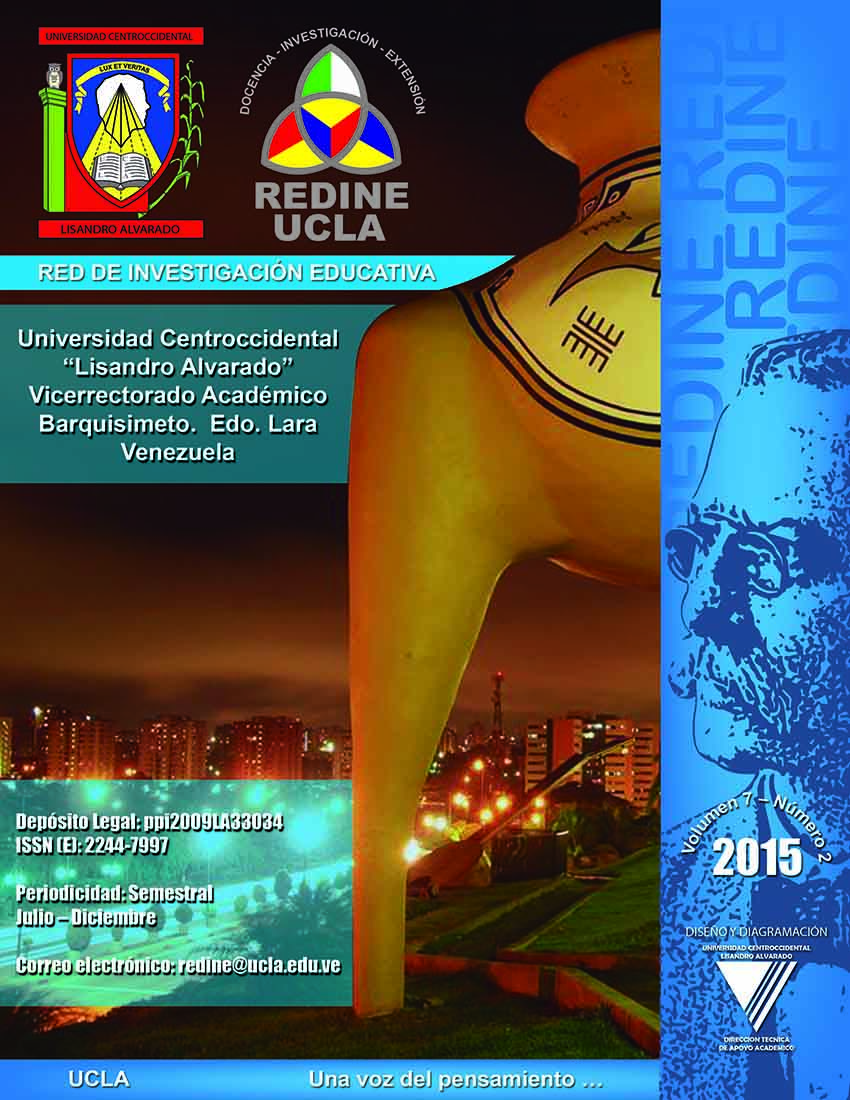educational approaches to courses online in the faculty of Health Sciences University Centroccidental Lisandro Alvarado
Keywords:
distance education, virtual education, pedagogical practice, axiology virtual education, technological innovationAbstract
The growth of virtual education (EV) in Venezuelan universities, has taken shape changes in education and therefore the meanings of social actors involved in this type of education. This reality is the basis of this study, which was proposed to generate Educational Approaches to the on lines Courses in the Faculty of Health Sciences (DCS) Centroccidental University "Lisandro Alvarado" (UCLA), in relation to its conceptualization, teaching practice and axiology of the online courses. Moreover, for that, it was assumed as basis epistemic social constructionism and qualitative methodological approach, interpretive paradigm and the phenomenological-hermeneutical method. The techniques and instruments used for data collection were dialogic depth interviews and online. The review of the information was using the method Colaizzi (1976), follower of Husserl, allowing addressing each of the witnesses and then go setting categories (3) with their respective subcategories (14). Educational approaches on the meanings of teachers regarding the conceptualization, teaching practice and axiology of Virtual Education through online courses generated. Also intersubjectivity between researcher and teachers allowed to appreciate the importance of incorporating ICTs or networks to facilitate the educational process in the virtual mode, and achieve new meaning embedded assumptions of social actors in that mode. It was believed that only in this way, the education from the virtual education process achieved its purpose.
Downloads
References
2012.Universidad Pedagógica Experimental Libertador. Instituto Pedagógico de Barquisimeto “Luis Beltrán Prieto Figueroa”.
Bixio C. (1998). Enseñar a aprender: construir un espacio colectivo de enseñanza-aprendizaje. Rosario: Homo Sapiens. Ediciones Argentina.
Cabero J, Ballestero C y López E. (2004). ¿Cómo mejorar la Práctica profesional de los Docente Universitarios. Algunos recursos y utilidades telemáticas. Pixel-Bit (22) Revista de Medios y educación.
Casas M. (1999). Cambio de Actitudes en Contextos Interculturales. Modificación de Prejuicios. Revista Electrónica de Geografía y Ciencias Sociales. Barcelona
Castells, M, (1998). La era de la información. La sociedad red.
Volumen I. México: Siglo XXI Editores
Colaizzi, P.F. (1976). La investigación psicológica como el fenomenólogo lo ve. En la RS “Psychological research as the phenomenologist views it” 1978 edition. The publisher is Oxford University.
Curci R, (2003). Diagnóstico de la Educación Superior Virtual en Venezuela.
De la Torre S. (2005). Un recurso para mejorar la calidad de la enseñanza. Vol 1. ISBN 84-9700-325-X, págs.
155-170
DUART, J. y Martínez M. J. (2003). "Educar en valores en entornos virtuales de aprendizaje: realidades y mitos". Universitat Oberta de Catalunya
(UOC) Barcelona: Paidós
Fontán J. M. (2006). Innovation socio territoriale et reconversion économique: Le cas de Montreal. Revista eure. Vol. XXXII, N° 95; pp. 126-128, Santiago de Chile, mayo 2006.
Galeano M.E. (2004). Diseño de proyectos en la investigación cualitativa. Medellín. Fondo Editorial EAFIT
García, A. (2001). La Educación a Distancia: De la teoría a la práctica Barcelona, España. Ariel
Guido (2009). Tecnologías de Información y Comunicación, Universidad y Territorio. Universidad Nacional de Quilmes. Argentina
Husserl, E. (1986). Ideas relativas a una fenomenología pura y una filosofía fenomenológica. México: FCE.
Levy, P. (1999). La Cibercultura y la Educación. [Documento en línea].
Lugo, M. (2003). Diagnóstico sobre la evolución, situación presente y perspectivas de desarrollo de los Programas de educación Superior Virtual en Argentina. UNESCO.
Lyotard, J. F. (1979). La Fenomenología. Ed. Paidós, Barcelona. (Paidós Studio, 76).
Mafessol, M. (2004). El conocimiento ordinario. Compendio de sociología. México. Fondo de cultura Económica. Pág. 216
Meng, P. (2005) . «Podcasting and Vodcasting: A White Paper», See more at: http://tiscar.com/blogs-para
educar/#sthash. ckcvRgQv.dpuf
Muñoz, J. (2009). La importancia de la socialización en la educación actual.[Documento en línea] en http://www.csicsif.es/andalucia/modules/
mod_ense/revista/pdf/ Numero_14/
JOSE%20MARIA_MUNOZ_1.pdf [Consulta: 2006, Agosto 30].
Padilla, A. (1999). Teletrabajo. Dirección y Organización. Alfaomega, S.A. Colombia
Reglamento de la Educación a Distancia en la UCLA. (2009).
Sandoval, C. (2007). Discurso y análisis social. Métodos cualitativos y técnicas de análisis. Compendio Rosa María Pochet. Revista de la Universidad de Costa Rica de la Red de Revistas Científicas de América Latina y el Caribe. [Documento en línea].
Disponible en: http://redalyc.uaemex.mx
[Consultado: 2007, Julio 07].
Santoveña Casal, Sonia Mª (S/F). Metodología Didáctica en Entornos Virtuales de Aprendizaje. Unidad de Virtualización Académica (UVA). Universidad Nacional de Educación a Distancia (UNED) Publicación en línea. Granada (España). Número 3. ISSN: 1695324X.
http://www.ugr.es/~sevimeco/
revistaeticanet/ index.htm
Published
How to Cite
Issue
Section
Copyright from the year of publication
This work is licensed under a:
Creative Commons Reconocimiento-NoComercial-CompartirIgual 4.0 Internacional (CC BY-NC-SA 4.0)
The opinions expressed by the authors do not necessarily reflect the views of the publication's editor or UCLA. Total or partial reproduction of the texts published here is authorized, provided that the complete source and the electronic address of this journal are cited. Authors have the right to use their articles for any purpose, provided it is done on a non-profit basis. Authors may publish the final approved version of their work online or in any other medium after it has been published in this journal.




